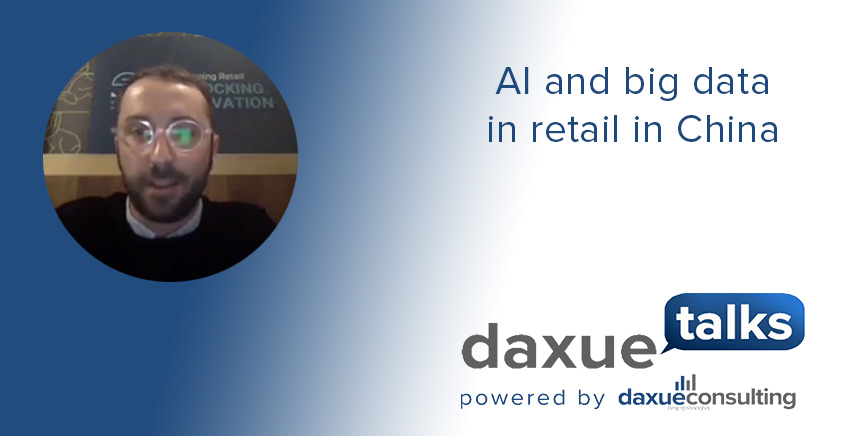Find here the Daxue Talks episode 25. Learn from Max Peiro how to combine a real in-house capability in China with a tech team and external collaborations.
Full transcript below:
Max Peiro: My name is Max Peiro. I’m obviously not Chinese. I’m from Barcelona, but I’ve been living for 12 years in Shanghai. And I am the CEO of Re-Hub. At Re-Hub, basically, we are problem solvers. We work with large corporations here in China to help them identify business challenges and match them with proven startups that can solve these problems.
Interviewer: What does Artificial Intelligence mean to the retail industry? What are some of the examples that AI has infiltrated the retail industry?
Max Peiro: AI means everything nowadays. And when we talk specifically about the retail industry, I think that AI can be implemented and it can provide value in any step of the supply chain and in any step of the customer journey. So, this is a very good question, but at the same time, it’s an extremely broad question. Maybe I can give some examples on different steps of the journey where AI can provide value. And also, I think it’s important to mention that AI and data are interrelated. One of the advantages of AI is the ability to process, analyze data, and then deliver insights on top of that.
So for example, if we start from the beginning, when you need to design a new product nowadays, you can leverage data and AI on top of data to really be able to understand trends to unlock opportunities, market needs, and to leverage these insights to design and to launch new products. And I think that this is extremely relevant across many sectors in retail. From FMCG, for example, right now there are AI-driven startups that can identify trends in taste when it comes to food or flavors. And then FMCG brands can leverage that to launch new products in specific markets. Obviously, it can also apply to fashion. You can use AI to monitor what are the upcoming street trends and then use that into the design of the products. Obviously, across the supply chain, AI is extremely relevant when it comes to inventory—leveraging AI to be able to make a forecast on inventory allocation, optimization in terms of product assortment of quantities across different geographies across different channels. When it comes to marketing—selling your products—AI plays a crucial role in customer segmentation, personalization, targeting, content optimization, etc. And at the end of the day, I would say that the good thing about AI is that it can help you on any step of the customer journey and any step of the supply chain. And what is more important is it can make an impact on either your top or your bottom lines.
Interviewer: How can a brand boost up its data capability in China?
Max Peiro: Brands need to be extremely realistic. And they cannot build full data capabilities overnight. There needs to be a plan and a long-term strategy. And on top of that, I would say that one of the main obstacles is not about technology. It’s not about the availability of data. One of the obstacles comes from inside the companies. It’s about their culture. It’s about their organization. It’s extremely important to make sure that everyone is aligned and that the organization is structurally in place to make the most out of this data or, I would say, to make the most out of the insights that you can extract from the data. We keep hearing from many clients that they have a problem with data. And it’s not that they have too little data. It’s that they have too much data. And they don’t know what to do with that. And at the end of the day, too much data creates confusion and frustration.
In the short term, if a brand needs to start from zero or from close to zero, I would say that the key would be to identify what are the insights that are most relevant for them that they could use to make an impact in their business and then work on solutions on how to identify this data and how to be able to extract these insights from the data. And nowadays, there are plenty of options on how to leverage data from companies like Tmall or Wechat but also working with technology startups based on specific business needs and then being able to leverage their solutions to extract data to solve that specific pain points. In the long term, I think it’s crucial that these brands are able to build up proper data strategy that is able to first collect the relevant data and then build data teams, of course, data lakes, DMP, etc. and then being able to beef up their data science capabilities. It’s not easy, but I think that nowadays, pretty much any corporation should have some data scientists in their team and then use that to extract insights. For whatever type of insights that they cannot extract themselves or they cannot obtain, just leverage external partners through that.
Any questions? We will find an expert to answer them. Drop your questions in the comments or send us an email at dx@daxueconsulting.com
Daxue Talks is a show powered by daxue consulting, a china-based strategic market research company founded in 2010! With Daxue Talks, you will stay up to date with all the latest business updates in China.





